It is no secret that Google is intent on making search results as accurate as possible, the recent announcement of “the most important update in 5 years” is a testament to that intention. The BERT update is an attempt at teaching machines human language. Google says they are aiming at search queries that take on a natural-conversational structure. So, BERT is supposed to let the search engine understand the context of the language being used. For a while, the nuances in search queries have been ignored and that leads to search results that are not as accurate as the searcher would want it to be.
On the surface, this may not seem as big as it is presented by Google but a deeper understanding of how it is likely to affect as much as 10 percent of searches may reveal just how big it is and how it will affect the world of SEO. The BERT update is likely to affect traffic to many websites and you may already be able to notice it if you analyze your own site.
BERT is already being used for general ranking so do not be surprised when some of the tools you use start to show your BERT ranking. Yes, this is probably another ranking to worry about and it is best that you understand it fully.
What is BERT?
No, it is not a tool named after someone called Albert or Gilbert or any other “bert.”

The BERT update is an abbreviation for Bidirectional Encoder Representations from Transformers. This is an algorithm that uses natural language processing or NLP in machines to help them understand the way humans use language. You may say it is a way of teaching machines human conversation only that in this case it is still limited to search queries.
BERT uses Transformers to analyze a word in a sentence and compare it with the other words in the sentence so that the context of the search query is evident. This means that BERT will look at the entire sentence as opposed to picking out a few keywords. It will also look at how the sentence is structured and where the prepositions are placed.
This is probably even more useful now that we are using voice searches which are more of natural speech. BERT is able to differentiate between “I am looking for glasses” and “looking glass” This algorithm is certainly aimed at changing the way people search and the way content is presented.
Let’s take a closer look.
How BERT Will Affect SEO?
Maybe you have just spent on SEO and you are worried that this new algorithm is going to turn all your efforts into waste.
Well, relax, it will not.
If we can go by the tweet of Google’s Public Search Liaison, Danny Sullivan, there is nothing different from what they have been emphasizing for decades.
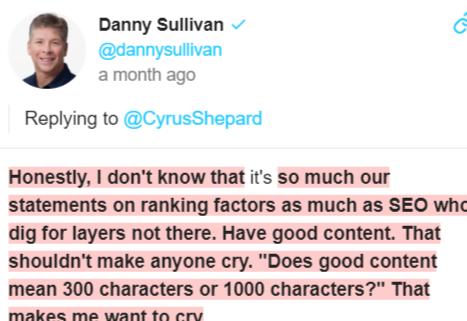
So, what does that mean? BERT is more of a commitment to good content. If you have been providing good content on your site, then there is not a lot to worry about. If, on the other hand, you have been writing for search engines, you have a lot to worry about.
Even though you may already be providing great content and you may not be able to directly optimize for BERT, there may still be something you need to pay attention to. BERT focuses on understanding the queries from users more than content. After understanding the question, it will find the most relevant content.
As a website owner or an SEO provider, this means you should also turn your attention to the questions that are being asked. It is not just about keywords anymore, your content needs to be able to provide direct answers to the queries. This presents an opportunity to maximize the impact of FAQs as well as “how-to” content.
BERT is more likely to pick up content that provides precise answers to questions. You, however, have to ensure that even if you are providing precise answers, it is not thin content.
BERT will likely make long-tail queries even more popular. It is worth checking to see if your website content will be chosen as the answer to long-tail queries.
BERT vs RankBrain

Looking at what BERT represents, it is natural to ask, “what will happen to RankBrain now that BERT is here?”
The short and precise answer would be nothing!
It is not a competition here.
When Google introduced RankBrain, it was intended to assist in a better understanding of search queries, this was Google’s first attempt to use artificial intelligence to improve search results. Google has never stopped trying to do this and that is why BERT is now here.
It is not a competition between the two, they are likely to keep on working side by side to make search results even better than before. Search results can be determined by either of the two or even by both of them. Do not forget all that you learned about RankBrain and think that you should only focus on BERT, the two work to complement each other even though BERT is like the improved version.
Let’s Take a Look at BERT in Action (Examples)
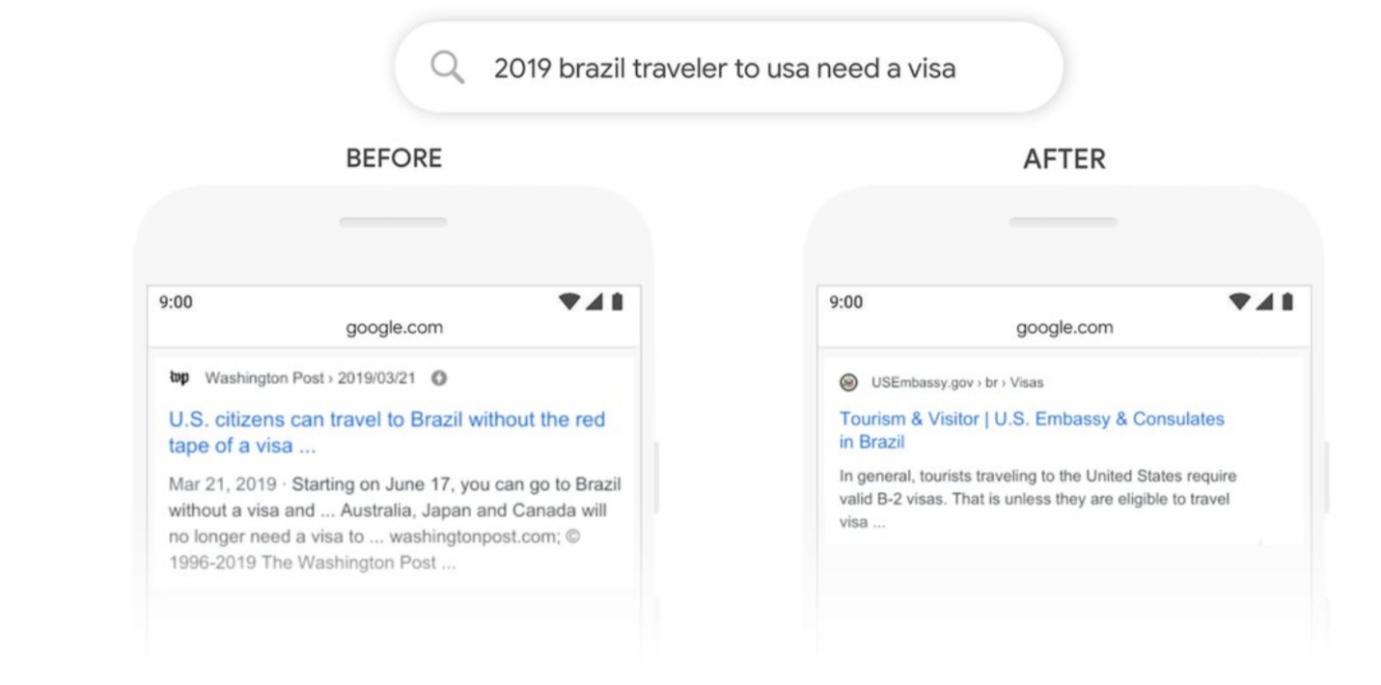
When Google announced the BERT algorithm, they provided a few examples to demonstrate how it would work. One example was the search query, “2019 Brazil traveler to USA need a visa.”
Before BERT, the top results for this query would talk about citizens of the USA traveling to Brazil without a visa.
After the BERT, the search result is more accurate and talks about tourists from Brazil traveling to the USA. The difference here is that Google is now more aware of words that it would not take into account like “to” and these make a difference.
This is what Google means by taking into account natural human speech. This search was in relation to a traveler from Brazil to the USA and not someone from the USA to Brazil.
Another example is the query, “Parking on a hill with no curb.”Before BERT, the emphasis is placed on the word curb so the results ignore the word “no”. This results in a snippet about how to park a car on a hill and use the curb as a block.
After BERT, however, the results are more specific to what the searcher is looking for and gives advice about parking on a slope that has no curb. This featured snippet is relevant to the question asked.
What it Means for Website Owners and Content Creators?
Google may insist that this is mainly about the searchers but the truth is it will affect the websites as well. If your site’s content is not being chosen because of BERT, then you will certainly see a change in the ranking of the site.
At the moment the best advice would be to keep on monitoring your site ranking and performance. Be on the lookout for any drop or even a rise in ranking and investigate if it may have something to do with BERT.
You also will need to rethink the ‘keyword density’ strategy. Even before the BERT announcement, many websites had stopped putting a lot of emphasis on keyword density. It is time to think about people and why they are searching online. Take note of these three:
– Information
– Navigation
– Transaction
These are the three common questions people ask online and you need to be able to answer them as precisely as possible. For example, an information query could be “how to make chocolate” the answer to this should be specific and focus on making chocolate and not the benefits of a milkshake with chocolate added. When they have the recipe, they may search for the ingredients and that would be a navigational query which would then be followed by a transaction one to find where to purchase the ingredients.
For a website, it is no longer about making a certain number of words, it is about giving the reader what they want as quickly as possible and ensuring what you give them is relevant and adds to their knowledge.
You also need to remember that the competition is going to get this information and try to apply it so it means the competition among websites to create great content is going to be even tougher, you need to prepare for that. Ensure that your content is better than the competition and that you are answering as many questions as possible and in the easiest way to understand.
Optimizing for BERT
At the moment you will be told there is nothing to optimize for this new algorithm and you should continue doing things the right way. However, every change needs to be reacted to and the reaction you make is optimization.
Like we already advised, monitor your website, look at the drops in ranking and pay keen attention to pages that may have dropped in ranking since the introduction of this algorithm. This is where you can start the optimization, find ways in which you can make those pages more relevant to what people searching are looking for. There may be a high possibility that you concentrated on keywords without the human-interest aspect.
In conclusion, it is no longer about being able to find content that mentions the keyword in there, you now need to be answering the questions in relation to the keyword and that’s the KEY to this update.
BERT FAQ
What is BERT?
BERT stands for Bidirectional Encoder Representations from Transformers. It is a new algorithm introduced by Google that uses Natural Language Processing or NLP to understand the context of search questions. With BERT, Google can provide more relevant search results.
When was BERT Rolled Out?
BERT was rolled out in October 2019. The announcement came in the fourth week of October and it was first rolled out for English searches but Google announced that it will be available sometime in the future for all languages in which Google provides search options.
What is NLP?
NLP stands for Natural Language Processing — this is a process of artificial intelligence that teaches machines the way humans speak. NLP enables artificial intelligence like chatbots to understand human communication. In relation to BERT, NLP is used to help search engines understand the context of search questions so that only the relevant answers are provided.
Is BERT Used in all Searches?
According to Google, BERT will only be used in 10 percent of searches, which means only 1 in 10 searches will be affected by BERT and at the moment, it is only for English searches.
Here are some more examples to look at:
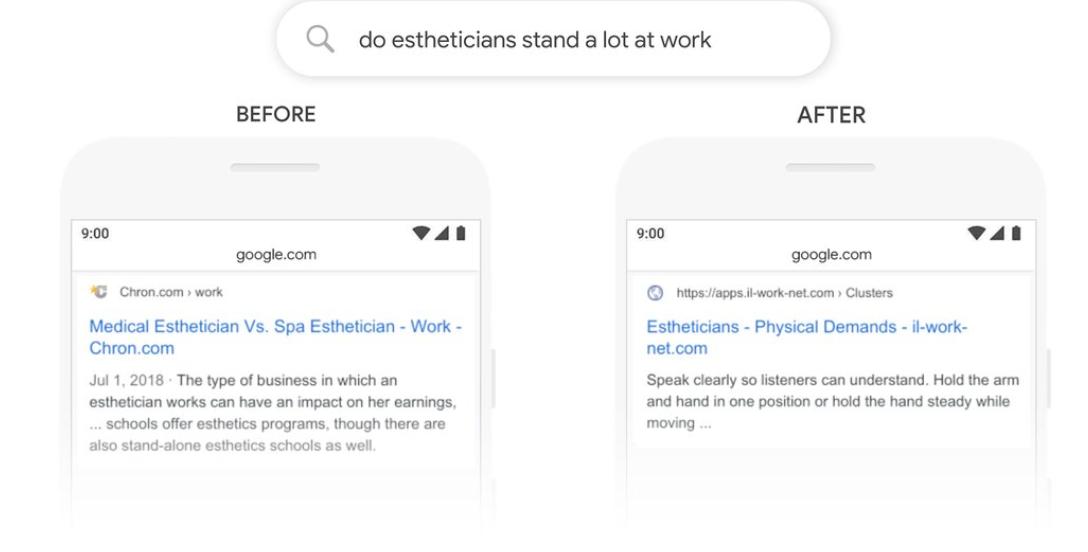
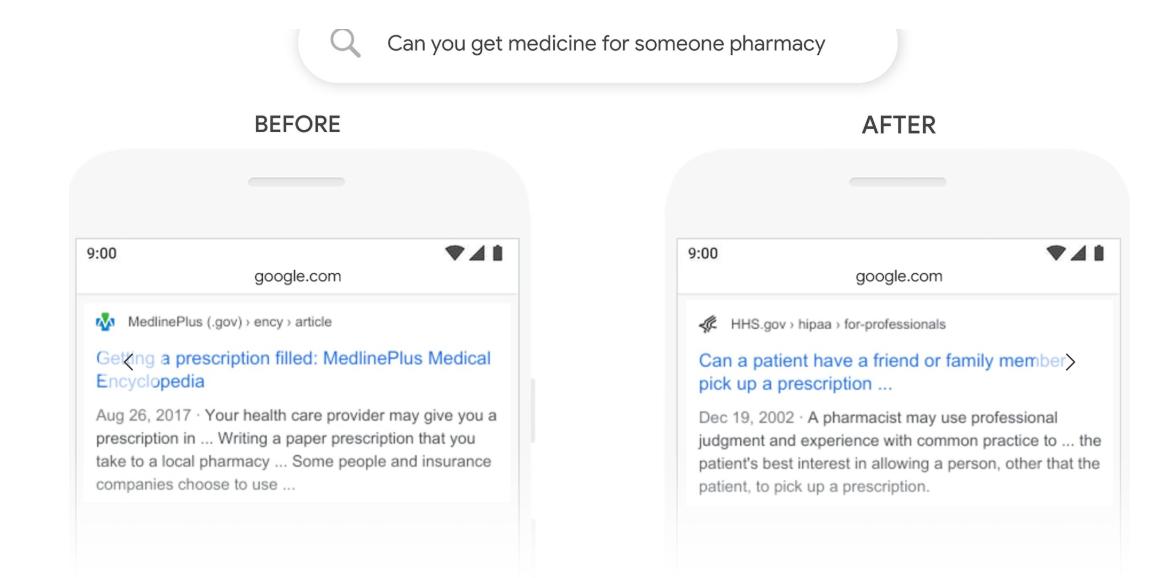
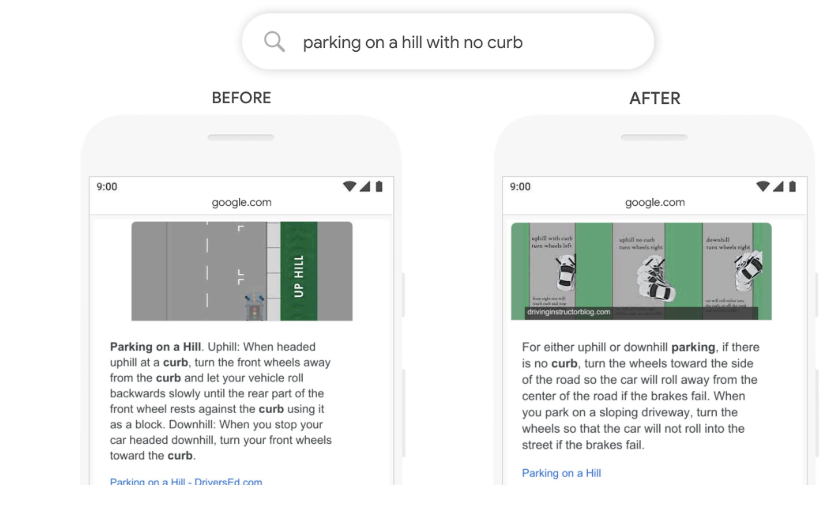
What is the Difference between BERT and RankBrain?
Although they are both ‘artificial intelligence’ geared at making search results more relevant, BERT and RankBrain are entirely different. BERT aims at understanding the words in a query in order to come up with the best contextual result, in other words, it will take into consideration the words before and after a keyword to understand the question.
RankBrain, on the other hand, will take into consideration past search results related to a particular query and then provide results that have ranked best in the past when a similar query was made. RankBrain is also able to guess what a user may be searching for even if the search is not specific. For example, a search for “the height of the tallest landmark in Paris” will result in information about the Eiffel Tower even if it was not included in the query.
What does BERT mean for SEO?
Since BERT focuses on the search queries more than the content, quality content will be very important and content needs to target providing precise answers to queries not so much about keyword density.
In a nutshell, it is a lot tougher to fool the search engine with keywords that may not be directly relevant to the content.
























